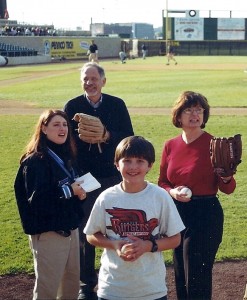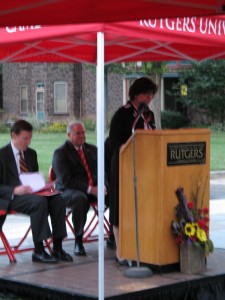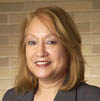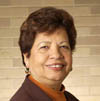In a few weeks, I’ll be saying goodbye to thirteen years of what I’ve called, tongue firmly in cheek, the “boss biz.” I had nine years as Dean of the Faculty of Arts and Sciences here at Rutgers-Camden before spending more than two as Interim Chancellor. Now I serve as Executive Dean, but soon I’ll be returning to my intellectual roots in the archives and the classroom.
These years have flown by, and although it’s been more than a year since I’ve announced my plans to leave administrative leadership at Rutgers, even now it seems a little bit unreal. Still, I am generally pretty good at looking ahead rather than backwards, and I’m eager to see what new challenges are in my future.
The best parts of my career have arisen out of serendipity, and I’ve always tried to make the most of timely accidents. That’s how I got to Rutgers in 1998. I had absolutely no intention of becoming a dean — again — when a friend on the faculty called to say he wanted to nominate me for the Arts and Sciences deanship. I declined. Then he said, “But wouldn’t you want to come back and do something for a place that did so much for you?” He knew I had been an undergraduate here many years ago, and he also knew that Rutgers–Camden had changed my life. “Couldn’t hurt to talk to them,” I found myself saying. A few  months later, here I was. The decision was made easier when my husband, the distinguished urbanist Howard Gillette, concluded that uprooting himself from a 29-year career at George Washington University to come to Rutgers-Camden would be the perfect next step in his career as well.
months later, here I was. The decision was made easier when my husband, the distinguished urbanist Howard Gillette, concluded that uprooting himself from a 29-year career at George Washington University to come to Rutgers-Camden would be the perfect next step in his career as well.
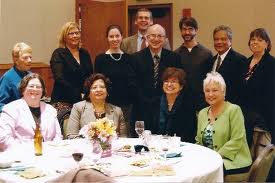
with Kathy Boyle, Nancy Rosoff, Andrea Ohrenich, Maria Garcia, Julie Strasser, Chris Dougherty, Luis Garcia, Tyler Hoffman, Mike Palis, Iris Rodriguez, and Louise Waters
In 1998 Rutgers–Camden was still largely an undergraduate institution, with a small number of graduate programs at the Master’s level, a recognized and respected Law School, and a relatively new School of Business. The entire campus had fewer than 4600 students. How much we have grown! Last fall, we had more than 6300 students, and more than 4300 were enrolled in the several schools and colleges of Arts and Sciences — the College of Arts and Sciences (which also houses an Honors College), the Graduate School, and University College. The Law School under Dean Ray Solomon takes pride in an excellent national reputation, and the School of Business under Dean Jai Ganesh has a full four year program and plans for significant growth.
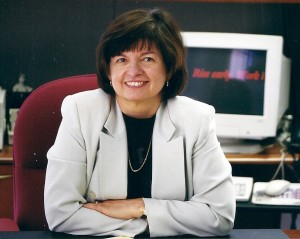 But we’re not just bigger. We’re better – as a campus and in Arts and Sciences, where we’ve transformed graduate education with the creation of innovative interdisciplinary Ph.D. programs, developed new master’s programs, and introduced a professional doctorate and an MFA. Undergraduate research and international study undergird programs in the Honors College and the College of Arts and Sciences more generally. University College-Camden retains its roots on campus but has also extended its operations to multiple South Jersey locations. Recently, it became the first Rutgers college to apply and be accepted to the Servicemenbers Opportunity College Consortium, and it is still the sole unit of Rutgers to have achieved such membership.
But we’re not just bigger. We’re better – as a campus and in Arts and Sciences, where we’ve transformed graduate education with the creation of innovative interdisciplinary Ph.D. programs, developed new master’s programs, and introduced a professional doctorate and an MFA. Undergraduate research and international study undergird programs in the Honors College and the College of Arts and Sciences more generally. University College-Camden retains its roots on campus but has also extended its operations to multiple South Jersey locations. Recently, it became the first Rutgers college to apply and be accepted to the Servicemenbers Opportunity College Consortium, and it is still the sole unit of Rutgers to have achieved such membership.
I’ve been so privileged to have led Arts and Sciences — and for two plus years as Interim Chancellor, the campus — during this exciting period of institutional transformation, and I’d like to thank many of the people who made our success possible. First, of course, I’m grateful to Roger Dennis, the provost who hired me, who was a wonderful boss and a great mentor. In Arts and Sciences, I want to start with Marie  Cornelia, who took on the twin duties of serving as associate dean for the Graduate School and University College in my second year as dean, and who during her tenure implemented an astonishing 12 new graduate programs. Dan Hart, my
Cornelia, who took on the twin duties of serving as associate dean for the Graduate School and University College in my second year as dean, and who during her tenure implemented an astonishing 12 new graduate programs. Dan Hart, my  first associate dean for the College of Arts and Sciences, not only systematized the operations of the college but was also a driving force behind the creation of the Center for Children and Childhood Studies, with founding director Myra Bluebond Langner, and the Ph.D. program in Childhood Studies. He now serves as director of the former and he recruited the inaugural faculty for the latter. Also, Dan took on the difficult task of “keeping the dean from doing stupid things.” I suspect I still did a few dumb things anyway, but I hope fewer than I would have otherwise.
first associate dean for the College of Arts and Sciences, not only systematized the operations of the college but was also a driving force behind the creation of the Center for Children and Childhood Studies, with founding director Myra Bluebond Langner, and the Ph.D. program in Childhood Studies. He now serves as director of the former and he recruited the inaugural faculty for the latter. Also, Dan took on the difficult task of “keeping the dean from doing stupid things.” I suspect I still did a few dumb things anyway, but I hope fewer than I would have otherwise.
When I began to serve what ended up as a two-and-a-quarter year stint as Interim Chancellor, campus enrollment had been declining significantly for two years. More than reversing that loss, Rutgers–Camden needed to grow substantially if we ever expected to achieve our goal of developing into a nationally respected public research university. It is true that mine was the voice leading the charge, but it was Arts and Sciences Associate  Dean Nancy Rosoff who coordinated a group of more than 50 administrators, faculty, and staff who worked to ensure that all of us knew what needed to be done to grow and at the same time maintain student quality and the personalized education that is the hallmark of this campus. And then we went on actually to do these things.
Dean Nancy Rosoff who coordinated a group of more than 50 administrators, faculty, and staff who worked to ensure that all of us knew what needed to be done to grow and at the same time maintain student quality and the personalized education that is the hallmark of this campus. And then we went on actually to do these things.
 Two of my other priorities were economic development and community partnerships. Vice Chancellor Larry Gaines and I would spend afternoons discussing what we needed to do, and then it was Larry who went out and did it — hiring our
Two of my other priorities were economic development and community partnerships. Vice Chancellor Larry Gaines and I would spend afternoons discussing what we needed to do, and then it was Larry who went out and did it — hiring our  first director of economic development, Gregory Gamble, and working regularly with our community partners. Nyeema Watson, then Associate Director of the Center for Children and Childhood Studies, and I spent a lot of time
first director of economic development, Gregory Gamble, and working regularly with our community partners. Nyeema Watson, then Associate Director of the Center for Children and Childhood Studies, and I spent a lot of time together as we sought opportunities to partner on programs with the city’s public schools.
together as we sought opportunities to partner on programs with the city’s public schools.
Dean of Students Mary Beth Daisey, who knows more about students’ lives outside the  classroom than anyone else on campus, made sure I always kept the students’ entire lives, and not just their academic interests, at the forefront of my mind. And Director (now
classroom than anyone else on campus, made sure I always kept the students’ entire lives, and not just their academic interests, at the forefront of my mind. And Director (now  Associate Chancellor) of Communications Mike Sepanic may not have completely succeeded in teaching me to be more tactful and less direct, but he could always be counted on to have just the right way to handle any public situation. Kristin Walker, (below) who became Director of Campus Events Planning during my first months in the chancellor’s role, made sure that the campus always
Associate Chancellor) of Communications Mike Sepanic may not have completely succeeded in teaching me to be more tactful and less direct, but he could always be counted on to have just the right way to handle any public situation. Kristin Walker, (below) who became Director of Campus Events Planning during my first months in the chancellor’s role, made sure that the campus always  put its best face on view. And Ray Solomon, Dean of the Law School and for eighteen months Executive Dean of the Professional Schools at Rutgers–Camden, continued to build the excellence of Law School, move the Business School forward during a time of major transition, and spearhead several additional campus initiatives.
put its best face on view. And Ray Solomon, Dean of the Law School and for eighteen months Executive Dean of the Professional Schools at Rutgers–Camden, continued to build the excellence of Law School, move the Business School forward during a time of major transition, and spearhead several additional campus initiatives. 
During the time that I was serving as interim chancellor, Interim Dean Mike Palis took the lead in implementing the recommendations of the 2006 Task Force on the Future of Arts and Sciences, a task force he had co-chaired, along with Associate Dean for the Graduate School Luis Garcia, whose outstanding leadership of the graduate school will be a lasting legacy. I commissioned the task force and gave its charge, but it was Mike and Luis who led a large and diverse committee of faculty, students, administrators, and alumni. The two of them, along with Associate Deans Tyler Hoffman, Nancy Rosoff, Chris Dougherty (recently named provost at Rosemont College), Allen Woll, who also heads the Honors College, and the rest of the task force members brought the vision we had created — transforming Arts and Sciences in order to propel the campus’s transformation into a top small public research university — into reality.
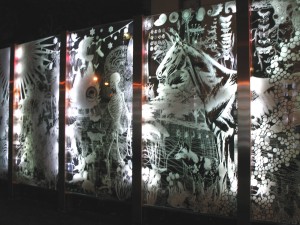 The alumni and friends who constitute the Arts and Sciences Dean’s Leadership Council also were critical to the implementation of that vision. Every time I walk through the monumental glass sculpture “Gateways” at 4th and Cooper Streets, created by the brilliant Clyde Lynds, I think about the afternoon in which the Council decided to embark on a mini-campaign to raise funds for scholarships and other student and faculty support.
The alumni and friends who constitute the Arts and Sciences Dean’s Leadership Council also were critical to the implementation of that vision. Every time I walk through the monumental glass sculpture “Gateways” at 4th and Cooper Streets, created by the brilliant Clyde Lynds, I think about the afternoon in which the Council decided to embark on a mini-campaign to raise funds for scholarships and other student and faculty support.
Ed Kiessling and Brian Baratz headed up the effort. Our development professionals, first Sharon Beales and then Jonathan Boiskin, provided the expertise. In short order we raised close to $4.5 million, nearly $2 million more than we had originally envisioned. The Council did not stop there. JoAnn Mower, who succeeded Ed and Brian, stepped down as chair last year. Pat Egan Jones heads the Council now, and Ed Spell is coordinating its fundraising efforts, ably supported by the development staff led by Suzanne Shaffer. For the new capital campaign, publicly launched last fall, Arts and Sciences had already raised almost $7.4 million, on our way to our $20 million goal.
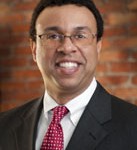 I’ve saved several very important thanks for the end: First, to Wendell Pritchett, our chancellor, who is a distinguished urban scholar and an exceptionally able administrative leader with a commitment both to the growth of this campus — in size, achievement, and reputation — and to its public role as an urban research university.
I’ve saved several very important thanks for the end: First, to Wendell Pritchett, our chancellor, who is a distinguished urban scholar and an exceptionally able administrative leader with a commitment both to the growth of this campus — in size, achievement, and reputation — and to its public role as an urban research university.
 Thanks also to Executive Vice President Phil Furmanski (on the left) and President
Thanks also to Executive Vice President Phil Furmanski (on the left) and President 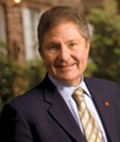 Dick McCormick for believing in our vision and supporting it with the university’s financial resources.
Dick McCormick for believing in our vision and supporting it with the university’s financial resources.
And once again, thanks to Mike Palis, whose outstanding leadership continued this year, among the highlights of which was the exceptionally successful recruitment of a record cohort of outstanding junior and senior faculty members. Next, to the terrific faculty of Rutgers-Camden, who excel both in teaching and research, with special thanks to our chairs and to graduate and undergraduate program directors. I was so fortunate to find, when I came to Rutgers-Camden, an excellent faculty in Arts and Sciences, who combined outstanding teaching, first-rate research, and a strong commitment to service. Without such a core strength, the transformative change that I intended for us to accomplish would likely have been impossible. Building a great faculty, if we hadn’t already had one, would have been a struggle. Continuing to build on excellence, however, was truly a pleasure. Third, to the directors and associate directors of Arts and Sciences’ Centers and Institutes who have enhanced the campus’s reputation regionally, nationally, and globally. Fourth, I want to acknowledge all my friends and colleagues in the School of Business and the Law School. It has been a delight to get to know so many terrific people in the professional schools.
I also want to thank all the talented people who support our students, beginning with our assistant deans Nancy Gulick, Danyelle Thurman, Jennifer Thiel, Natasha Tursi, and advising assistant Krista Whelen. Thanks also to the EOF staff to all the dedicated people in Student Affairs and Enrollment Management. Next, to my friends in the professional and administrative staff all over the campus, to the secretarial and support staff, to those in the Rutgers Police and security forces, in maintenance, facilities, dining, and the trades. These are the people who make this institution function every day, and they are among the best and nicest people on the campus. I owe a great deal of gratitude to the FAS tech staff, whose long-time director, Harold Winshel, lost his battle with brain cancer last October, and whom we miss very much. The unit is now ably led by Rich Buonpastore, and I am grateful to him and his staff for their tolerance and exceptional technical expertise. To computing specialist Scott Kuhnel for his help with The Fertility Doctor and other technical matters, and to Emily Corse in Instructional Design for demystifying the creation of web pages and blogs.
I don’t want to forget my friends and colleagues across the university, from Karen Stubaus, Nancy Winterbauer, Bruce Fehn, Barry Qualls, Mike Pazzani, Tony Calcado, Kim Manning, Ray Caprio, Carol Konscol and many others in Central Administration who have provided support over the years, to Carol Herring, Tracy Elliott, Joyce Hendricks and everyone at the Rutgers University Foundation, to Chancellor Steve Diner and to my fellow deans in New Brunswick and Newark who have been such great colleagues. At the Alumni Association, Chuck Mannella, Donna Thornton, and RU Alumni President Jim Rhodes make me proud to be counted as an alumna.
And next, to the excellent FAS dean’s office staff — Julie Strasser, Louise Waters, Edwin Alicea, Pennie Prete, Pat Piccoli, Andrea Ohrenich, Kathy Boyle, and our honorary staff members, security guard Wayne Adair and Marie Ragin Lee, who takes care of our offices.
Last and most importantly, my great gratitude and admiration goes to two people who have been with me right from the start — Executive Assistant Iris Rodriguez and Business Manager Maria Garcia. Exceptionally talented and accomplished, Maria and Iris are the heart and soul of the dean’s office. Over time they’ve also made me feel like a project under construction. Iris has kept me on time and Maria kept me under budget!
These past thirteen years at Rutgers–Camden have been the most meaningful and fulfilling of my professional life. I’m looking forward to the next stage of my career with deep gratitude to all of those who have made these years such happy and productive ones, and who have been real agents of transformation.

